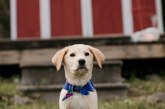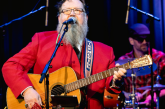
Corrections: Amelia Bartlett’s company a/b studios produced the Sweetwater-set romantic comedy short How to Get the Girl, attached to the campaign and feature film concept called Falling for Sweetwater, and the short film Lavender Fields Forever is her first film as writer/director.
By: Will O’Brien
“BLANK is like sitting at a family dinner table,” says longtime writer for the outlet Amelia Bartlett. “It’s not one personality – everybody brings their stories to the table, everybody brings their voice, their perspectives and their interests. … BLANK Newspaper is a pool party.”
Originally from the Sun Coast of Florida, Bartlett’s story with BLANK began after an arduous journey to find her place in that regional media landscape eventually led her down a path of entrepreneurship and self-assurance.
“I have always been a writer, and I really enjoy hearing other people’s stories,” she says. “My dad was very much a storyteller growing up, and so before I even moved to Knoxville, I published a magazine called St. Petian, which was an arts and culture magazine in St. Petersburg, Florida – my hometown. Because I love stories and I love places, I’ve always really been into being in-community and supporting small businesses.
“The overlap of my love of writing and storytelling kind of happened naturally. I don’t know if I’ve ever really been able to call myself a ‘journalist’ with confidence, but when I moved to Knoxville, I started working with The Maker City, and they had me publish a piece in BLANK Newspaper about the summit they were having. Rusty was like, “Hey, if you ever want to write for me again, then you’re welcome to it. I love your work.”
For the past decade, Bartlett has dedicated herself to building other people’s businesses in addition to her own. These have included but have not been limited to enterprises in media, retail, fashion, technology, finance, investment and more. They’ve encompassed nonprofits and professional services, as well. Her journey from St. Petersburg to Knoxville was not without hurdles, though.
“St. Pete didn’t have a BLANK Newspaper. We had this thing called Creative Loafing, which was part of a chain of papers, but it was hard to get into. You had to know somebody who knew somebody. Here, I’ve referred multiple writers to BLANK – people who are involved in the community, and it’s very accessible.
“I mean, the newspaper is free, and it gets delivered to hundreds of places. I think that Rusty [Odom] has something very unique in BLANK Newspaper. For me, if I wanted to publish in St. Pete, then I had to do it myself. I created my own magazine. There was nobody taking in new writers, young writers, inexperienced writers. Rusty will take a chance on someone and give them a platform.”
Bartlett started writing for BLANK 2017. Since the beginning of her writing career with the publication, she has authored more than 35 articles and feels that the paper has created a space for her to explore ideas and community spaces that truly resonate with her.
Although BLANK may sparingly assign employees to a story, she feels that it has “always been so open to my vantage point from within the community.”
This sense of creative freedom and exploration has permeated into her other mediums, as well; since she started with BLANK, Bartlett has gone on to establish her own production house, a/b studios, and direct multiple short films and creative pieces.
Notably, her experience chasing small-town stories in the city of Sweetwater, Tennessee, for her second film proliferated into a tourism commercial that she developed into an independent short-film romcom, “Falling for Sweetwater.”
“The tourism project that I did with the city of Sweetwater, BLANK really prepared me for,” Bartlett says. “It taught me how press worked; it taught me how to engage with people that are publishing articles. That project increased traffic to the city of Sweetwater during the campaign by 29% during February. We made Sweetwater a Valentine’s Day destination while it was 32 degrees, and it was slammed.
“That kind of thing was me saying, ‘Hey Sweetwater, I want to make a short film that is a commercial for your town.’ That was taking storytelling, coupling it with narrative media and also press media, getting articles written, going on television, being in podcasts.
“What I’ve learned as a journalist helped me with my second film. I was able to execute this pretty large press plan simply because I knew how press worked. I knew how to contact journalists, I knew what they needed because it’s what I need as a journalist. That really paved the way for me to know how to deliver a really good tourism/marketing strategy. That film has progressed my career in ways that I’d never imagine.”
Bartlett has pursued a consistent path in her writing and filmmaking. In short proximity to “Falling for Sweetwater,” she was connected to prolific cinematographer Curren Sheldon at Film Fest Knox, who would later attribute his skills to her newest film, “Lavender Fields Forever.”
To Bartlett, BLANK has played a significant role as a guiding light to those who can help with her goals and achievements.
“BLANK has afforded me this access and this mutual benefit where I can go into a space and give to the person that is giving me their story,” she explains. “‘Yo, here’s press. You’re going to be online, and you’re going to be in print. Press is forever.’ But then I get to access them in such a unique way. It has really helped me achieve a lot of the things that I have hoped for simply because I was able to access the right people.”
Professional strides aside, BLANK has also played a significant role in Bartlett’s personal life, all starting with a lead discerning which restaurant in Knoxville served the best pho, a Vietnamese soup.
“BLANK has given me some of the best things in my life,” she says. “Over 2018 and into 2019, Rusty let me go to all of the different pho restaurants in town and decide where the best pho was, in my opinion. On one of those outings, I invited this new guy friend that I had met, and I was like, ‘Hey, I’m writing this article – do you want to come with me and I can get your opinion?’. We’re engaged now.”
On a national scale, we are seeing the widespread love for print journalism and journalistic integrity circle the drain at breakneck speed. Whether it be print, film or digital media, Bartlett remains a staunch advocate for print journalism and connecting with community in a tangible fashion.
“I’m someone who has always loved print,” she says. “Even when I lived in a tiny house, I kept all my books because I really treasure being singularly focused. I’m neurodivergent, so with holding a paper and reading a paper – just like holding a book and reading a book – there’s no notifications, there’s no distractions. Now, I feel like we’re seeing a very big print renaissance where all these high-end brands are like, ‘And now we have a magazine! And now we have a keepsake!’ Zines are really making a comeback.
“I think that Rusty’s commitment to print, [especially] when everyone else was going online, he went harder for print. When everyone was starting a podcast, he went harder and put more pages in. He sold more ads so that he could afford more articles. I have respected that so much because it wasn’t an easy choice, it wasn’t a choice that everybody was on board with.
“Not at BLANK, but in the market, most people were like, ‘No, newspapers are dead!’ And Rusty really weathered that storm, and I have a lot of respect for that because he is still here and BLANK is a fixture in this community.
“I think now more than ever, print artifacts are what really move people to get to know their community better and get to know their neighbors better and to actually be involved with the stories that are happening in their town.”
Regarding the emergence of artificial intelligence taking a stronghold on the public’s psyches and interests, Bartlett and other BLANK writers are doing all that they can to keep the inherent connection of individual to community afloat. What seems like an uphill battle for most serves as a trademark of quality for Bartlett when it comes to the paper.
“So much news, like the headlines, are meant to drive your blood pressure up – especially online,” she says. “To be honest, I haven’t looked at a print newspaper in quite some time, but I know that online headlines are designed to play into your psychology. Frankly, I don’t want to be manipulated around every turn. BLANK isn’t trying to trick me into reading something or trick me into wanting something. It’s like, ‘This is what we have! It’s yours if you want it, but you don’t have to. You can skip it. We’re not trying to steal your attention or take you by force.’ It’s a gentle paper. I feel like gentleness is the antidote to how much stress the rest of the world’s news is constantly putting on our plates.”
Through these algorithmic filters and covert funnels of information, it has become a daily struggle for individuals to uphold their trust in traditional media outlets and has even spread to media outlets as a whole. This isn’t an issue of integrity; it is an issue of manipulation, greed and fearmongering. In the face of corporate extortion and misinformation, BLANK remains steadfast in its fight against the common enemy of today: isolation from community.
“Hard news is so focused on being so consistent that it loses its heart, and it just becomes like a ticker tape,” Bartlett says. “I don’t read BLANK for the information; I read it for the experience. I read BLANK for the stuff that I might not be able to find out on my own, that the algorithm will not serve me. But there are human beings that are curating BLANK to be like, ‘This is good stuff that’s happening here.’ I’m not having to worry about being traumatized if I turn the page.
“Because we are so inundated with algorithmic choices, the fact that we have this thing that humans are curating and humans are putting together, no algorithms involved. People need to know that that’s still possible. Bleak is definitely a word I would use to describe the dystopian, authoritarian landscape that we are already living in: this hellscape. But what to me feels like an antidote to bleakness is the choice to keep doing something for fun. … BLANK does what is fun, what is good, what is human”.
Bartlett is correct in that humanity drives this paper, and that begins with a radical sense of trust in your fellow human beings: trust that they can get the job done, trust that they truly care and trust that human discourse and opinions are what have gotten us to this point in history.
“What Rusty has here is really his decision to trust,” she concludes. “His decision to follow intuition and to afford other writers, storytellers, artists and pillars of the community that same generous offering. I have no notes. Keep letting BLANK steer because it is the most human thing we have.”







